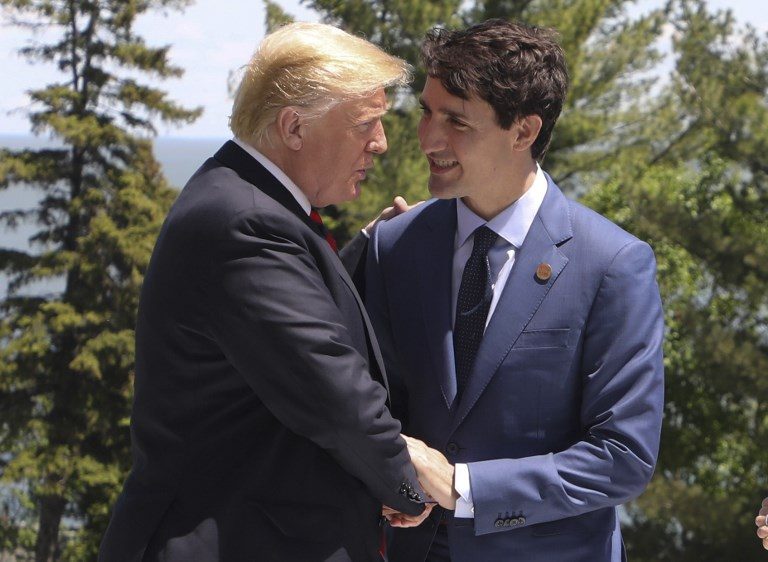SUMMARY
This is AI generated summarization, which may have errors. For context, always refer to the full article.

WASHINGTON DC, USA – Canadian Foreign Minister Chrystia Freeland announced a breakthrough Tuesday, September 11, in tense talks with the United States on a revamped continental trade pact, saying a new deal was now “imminently possible.”
US President Donald Trump also said earlier that the talks, which both countries ramped up in recent weeks, were coming along well.
After a year of effort, Washington and Mexico City announced an agreement in late August and Trump’s administration has informed Congress it plans to sign a new treaty by November 30, including Canada if possible.
“Achieving that deal is going to require good will, good faith and flexibility on both sides, and we think that’s imminently possible,” Freeland said after the latest set of bilateral meetings in Washington with her American counterpart, US Trade Representative Robert Lighthizer.
“It is very important to inform” Prime Minister Justin Trudeau in person about the latest developments, she added.
US President Donald Trump also said the talks, which both countries intensified in recent weeks, were coming along well.
Prime Minister Justin Trudeau warned, however, that potential US auto tariffs could be “devastating” for industry in both countries.
Trump has raised pressure on Ottawa, threatening to impose duties on Canadian auto imports, which Trudeau said would be “devastating” for the Canadian auto sector.
“But it would also be devastating to the American auto industry. It would cause a massive disruption and I think lots of layoffs in the United States,” Trudeau said on Canadian radio.
“I think it’s something that we obviously have to be aware the president is contemplating.”
In reaching a new NAFTA, Canada is protecting its interests but also “looking to be flexible because it’s time to update this deal after 25 years,” he said.
At the White House, Trump told reporters Canada wanted a deal “very much” and that talks were “coming along well.”
“We have all been dealing in good faith,” he said.
Freeland returned to Washington on Tuesday to continue meeting with her US counterpart.
She pointed to the 17th anniversary of the 9/11 attacks as a reminder of the need for close cooperation between Ottawa and Washington.
“I think that remembering today, and what happened today, maybe that helps us all to put into perspective the negotiations that we’re having,” Freeland told reporters, noting the “importance and significance” of US-Canadian ties.
“At the end of the day, we’re neighbors,” Freeland said. “At the end of the day, neighbors help each other when they need help.”
‘Still some distance’
Freeland emerged after meeting with Lighthizer, saying talks were occurring in a “good” atmosphere.
“The atmosphere is absolutely professional,” she said.
Major stumbling blocks for Ottawa and Washington remain: an international system for resolving disputes, Canada’s protected dairy industry and Canadian cultural subsidies.
“We’re negotiating all this at once. These are complicated subjects and there’s still some distance” separating the two sides, said one source close to the talks who spoke on condition of anonymity to describe pending negotiations.
Still, “with a bit of flexibility, things could move quickly,” the source added.
After her stop in Washington, Freeland is due to attend this week’s meetings of the governing Liberal Party of Canada in Saskatoon, Saskatchewan.
US Ambassador to Canada Kelly Craft meanwhile delivered an address in Gander, Newfoundland, where dozens of in-bound flights were diverted in the immediate aftermath of the September 11, 2001 attacks.
“Forget what you read about NAFTA negotiations and Twitter wars. That’s not who we are,” Craft said in prepared remarks.
“Sure, it’s business and it’s important, but Gander is the place that – in a snapshot – illustrates the Canada/US relationship.”
Trudeau, for his part, added that: “we’re just going to stay working constructively to get to that win-win-win that we know is there.”
Yet, he stressed that “if we sign the deal it’ll be… for Canada and Canadians. And if we don’t sign the deal, it’s because no deal is actually better than a bad deal for Canada.” – Rappler.com
Add a comment
How does this make you feel?
There are no comments yet. Add your comment to start the conversation.